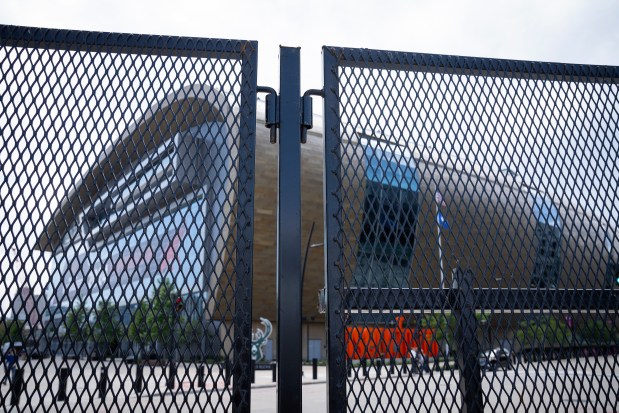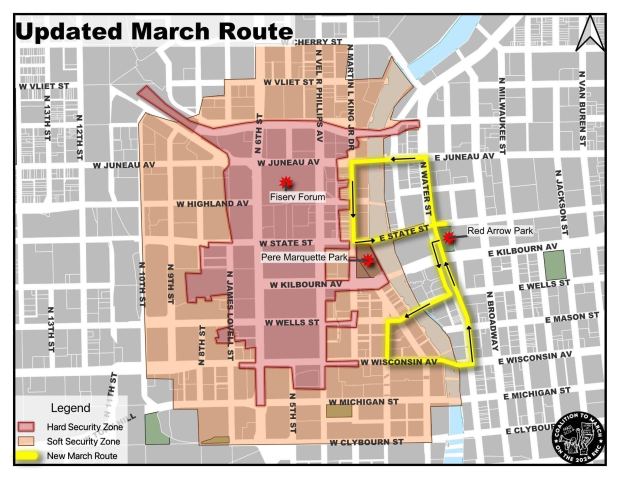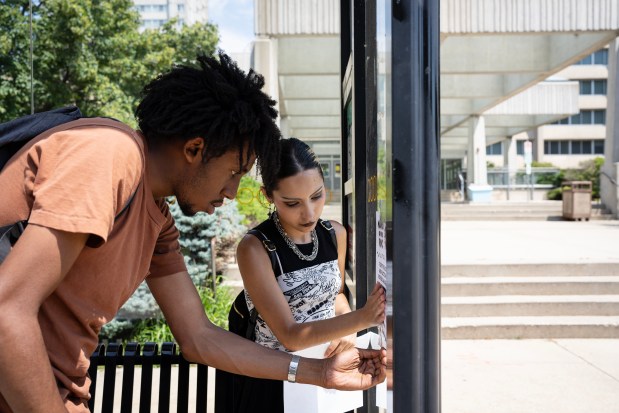MILWAUKEE — Police presence and security are being heightened for this week’s Republican National Convention following an assassination attempt Saturday on Donald Trump in Pennsylvania. But thousands of protesters still plan to descend on downtown Milwaukee for Trump’s expected presidential nomination despite several legal hurdles and concerns about how accountable police will be if events get out of control.
The marches are expected amid a backdrop of a federal judge’s ruling last week in which he said one of the largest protest groups couldn’t rally Monday within the tight security zone around the Fiserv Forum where the main convention activities will occur. In addition, the Milwaukee Police Department continues to insist it can suspend a city rule that requires the release of body-camera footage within 15 days after police shootings or in-custody deaths.
The ruling by the federal judge in Madison comes as similar arguments have been made in Chicago by a group planning to protest at next month’s Democratic National Convention. The ongoing Chicago case, which appears close to being settled, likewise aims to get protesters closer access to the United Center and McCormick Place during the DNC.
While Chicago isn’t suspending its body-cam policy, which requires releasing police shooting videos in 60 days rather than 15 days, DNC protesters have raised other concerns about CPD’s plans, including the possibility of mass arrests and infringing on their First Amendment rights of free speech.
What’s more, the DNC could see larger numbers of protesters than the RNC with many activists saying they are opposed to President Joe Biden’s stronger pro-Israel stance on the war in Gaza.
“Normally, the RNC tends to draw more people but this year with everything happening in Palestine, people are more angry with Biden,” said Alan Chavoya, a leader of the biggest protest group in Milwaukee.
Despite the hurdles in Milwaukee and the Pennsylvania shooting at the Trump rally, leaders of one of the largest groups protesting at the RNC said their plans for marching Monday will not be deterred and that they are trained for many different outcomes, including how to de-escalate conflicts should any erupt with police.
At a news conference Sunday, Omar Flores said the coalition on Saturday evening reconfirmed with the city the 2-mile march route it had redrawn following the judge’s ruling to adhere to security perimeters. Flores said the coalition was prepared for any last-minute security changes and expected the city to maintain their agreement.
Following two years of planning, the Coalition to March on the RNC is expecting 5,000 demonstrators to march in Monday’s rally, the group’s leaders said.
The coalition is marching on five “points of unity” — opposing a Republican agenda that is “racist and reactionary;” defending women’s, LGBTQ and reproductive rights; defending immigrant rights; calling for peace, justice and equity for all; and standing with Palestine.
“I knew that we had to get organized so when they (Republicans) are here, Milwaukee sends a strong message that we oppose their values,” said Chavoya, who is also finance co-chair of the coalition.
To have their voices heard clearly, the coalition in early June filed a lawsuit against the city of Milwaukee for not approving a parade permit that would bring them to the Forum. The group applied for the permit two years ago, soon after the GOP announced it was holding its convention in Milwaukee, said group spokesperson and co-chair Omar Flores.
Although the coalition was represented by the American Civil Liberties Union, which argued the restrictions violated the protesters’ free speech rights, the federal judge in Madison said “the First Amendment does not allow them to protest or parade in any way they choose” and sided with a plan that established a parade route about five blocks from the arena.
“We want to have our message heard by the Republicans, so I am disappointed,” Flores said.
While protesters are upset about the new route for the march, the suspension of the policy regarding body-camera footage is a point of concern.
Suspending the policy is significant considering the large number of law enforcement officers from all over the country who will be in downtown Milwaukee during the RNC, a development that was underscored by the assassination attempt. Milwaukee Chief of Police Jeffrey Norman said officers from the Chicago Police Department will be assisting.
The Milwaukee Police Department has defended suspending the body-cam release policy, in part, because it would be too difficult to coordinate the city’s policy with the federal and multi-state agencies assisting with the RNC. Norman added that while the policy will be suspended, he’s confident major scenes will be videoed.

“If you can find an area where there’s not going to be a camera, a hand-held phone, a surveillance camera, a media camera, I really want to know that spot because this is going to be well watched and recorded,” Norman said in an interview.
While protesters have expressed anger about suspending the policy, calling it “undemocratic,” the coalition’s leaders said they also have trained marchers in techniques of conflict resolution and de-escalation.
“If there are counter-protesters, we aren’t going to react but redirect people. We’re not here to engage with others, we’re here to stand up for our community,” said Diego Flores, who heads the coalition’s security team.
The team has been divided into three groups with colored vests for identification. Yellow vests denote marshals who will form a perimeter for the march, orange vests for those who will interact with law enforcement and red vests for medics.
Diego Flores said his goal is for the security team to behave like “a well-oiled machine.”
“Obviously the total size of the march is larger than the number of marshals, so the role they will play in coordinating and directing the crowd is key,” Diego Flores said.

Police, said Norman, aim to be “invisible” because the focus of the week should be on the convention and not clashes that could erupt between law enforcement and protesters.
Jeff Fleming, the city of Milwaukee’s director of communications, said that groups and individuals had the opportunity to sign up for one of the two demonstration areas and for the parade route. The city of Milwaukee received more than 100 requests in the past few months for slots at both demonstration areas at Haymarket Square and Zeidler Union Square, which are north and south of the forum respectively.
While demonstrators at Haymarket Square will be within sight of Fiserv Forum, the size of the square itself might be insufficient for hundreds of protesters, potentially forcing some to spill onto the surrounding streets. Zeidler Union Square is larger but not within sight of the convention.
Each slot is for 20 minutes at half-hour intervals, giving demonstrators a 10-minute buffer time. City-authorized civilians who are trained in conflict de-escalation will be present to manage the demonstrators.
“These people have voluntarily signed up for slots and to this day have followed our rules so we would expect the same behavior to continue (during the RNC),” Fleming said.
Malavika Ramakrishnan is a freelance writer.



